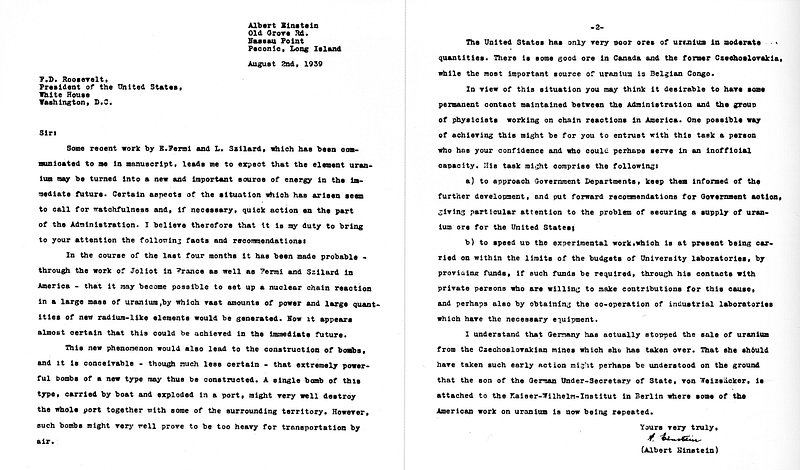Einstein's Urgent Letter and Its Impact on History
Written on
Einstein's Correspondence with President Roosevelt
In the summer of 1939, as the world teetered on the brink of war, a remarkable exchange took place between the renowned physicist Albert Einstein and U.S. President Franklin D. Roosevelt. This correspondence, initiated by an urgent letter, would have lasting ramifications for humanity. It’s intriguing to see Einstein, predominantly associated with theoretical physics, engage in geopolitical matters during such a tumultuous period. The global unrest compelled even the most apolitical scholars to confront pressing political realities.
While residing in the serene surroundings of Peconic, Long Island, Einstein was approached by fellow physicist Leo Szilard. Szilard, among a group of European scientists, was investigating the potential for a chain reaction in uranium, fearing that Nazi Germany might be on the verge of developing a groundbreaking weapon. The recent discovery of nuclear fission by Otto Hahn and Fritz Strassmann only intensified these concerns.
To avert this dire scenario, Szilard urged Einstein to draft a letter to the President, warning him of the looming threat. United by their apprehension regarding the possibility of Germany developing nuclear arms, both men were deeply troubled by the implications of such advancements.
In his letter dated August 2, 1939, Einstein detailed the latest scientific discoveries, particularly the phenomenon of nuclear fission. He stressed the seriousness of the situation, noting that this breakthrough could lead to the creation of “extremely powerful bombs of a new type.”

Einstein recommended that the U.S. government fund experimental research in this area, which was lagging behind other nations. He also highlighted the significant deposits of uranium ore found in Czechoslovakia and the Belgian Congo, emphasizing the strategic necessity of securing these resources.
Einstein's letter, driven by the dread of emerging weapons, ignited what would eventually become the Manhattan Project. It exemplifies how even a pacifist like Einstein felt compelled to engage with global crises for the greater good. This correspondence signifies the profound impact that scientific insights and their advocates can have on political and military dynamics, ultimately altering the trajectory of history.
The Einstein-Szilard letter is regarded as one of the most pivotal communications of the 20th century. In this video, we explore its historical significance and the implications it had on nuclear research and warfare.
This video discusses the Einstein letter and its connection to the development of the atomic bomb, shedding light on the moral dilemmas faced by scientists during this era.
Thank you for taking the time to read this overview. If you enjoyed this narrative, feel free to support my work by clicking the clap icon or considering membership on Medium. Stay tuned for more engaging stories!